Want to start a successful online business?
You’re in the right place. Because today, you’ll learn how to start an online business from scratch.
Ready to learn more? Read on!
How to start an online business
What is an online business?
Top 10 online business ideas
How to start your online business
What is an online business?
An online business is a small business that you operate fully online. You can start an:
- E-commerce store
- Service-based business
- Digital product business
- Affiliate marketing business (and sell other people’s products and services)
You’re not alone with your dream of starting an online business. Statista estimates that by 2027, half of the workforce will be self-employed.
The beauty of an online business is that it doesn’t cost much to get started and you can scale much faster than a brick-and-mortar business. Plus, you have the freedom to work from anywhere and be your own boss.
What’s more, you can start an online business that truly works for YOU so that you get to have a bigger impact in the world.
Get the Ultimate Guide
for building a
6-Figure Coaching Business so you can achieve more freedom!
Those were the reasons I started my own online business.
In my mid-20s, I found myself in the corporate world, leading a team at an ads tech startup and overseeing a budget worth millions.
I had “made it”…but I didn’t feel fulfilled.
I desperately wanted to find a way out. But the thought of giving up my secure paycheck? I’m MASSIVELY risk-averse, so you can guess how uncomfortable that felt to me.
Things took a turn for the worse when my family had to deal with several life-threatening emergencies in the same year. And suddenly, I had found my “why” for starting a business – I didn’t want to depend on vacation days anymore to be there for my family.
And boy, am I glad I took that leap. Today, I run a multiple 7-figure online business and have helped thousands of people start their own online businesses and make their dreams a reality.
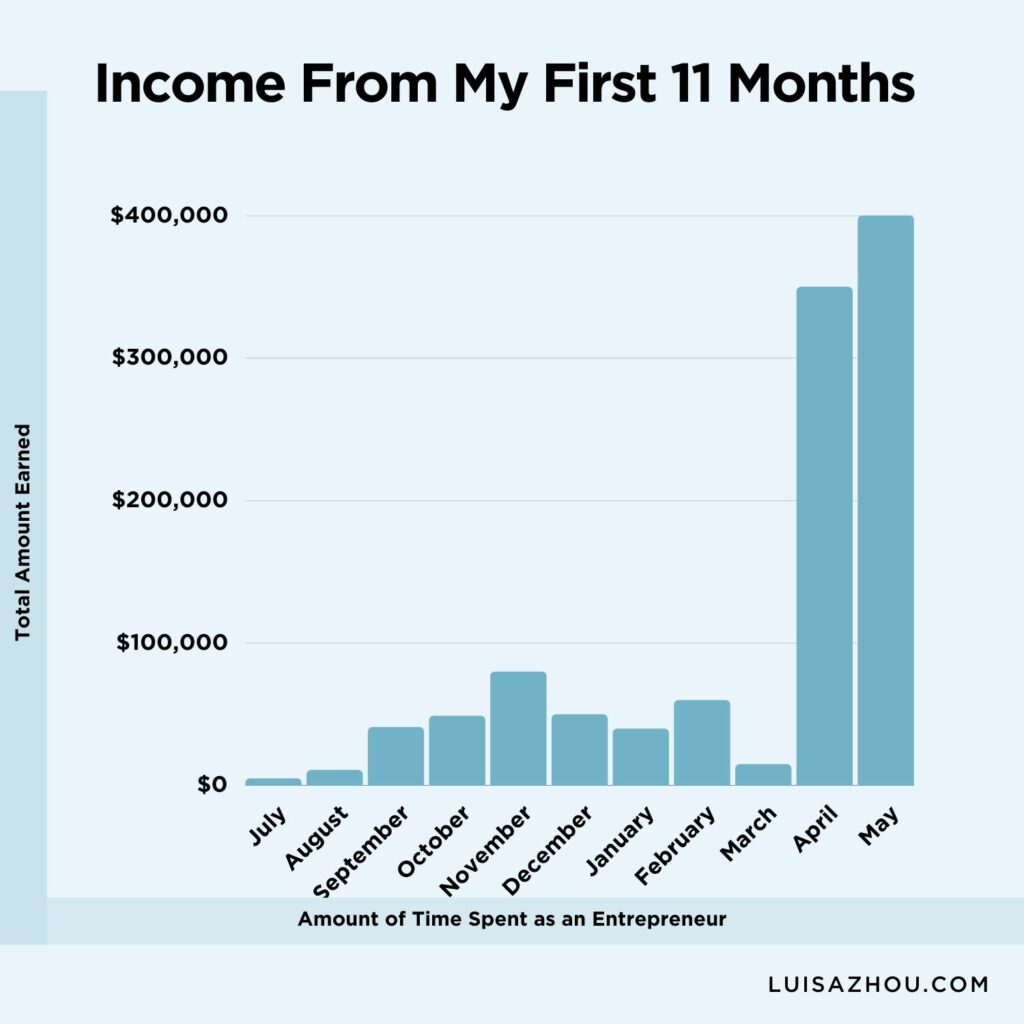
Starting a new business is not easy, but it is doable.
The first step is to find your business idea. Here’s how:
Top 10 business ideas in 2023
The top 10 online business ideas are:
- Coaching
- Consulting
- Freelancing
- Online courses
- Agency
- Creator business
- E-commerce business
- Online marketplace
- Software and app development
- Online membership sites
The thing is:
You might think that starting a business requires you to have unique online business ideas. You know, the “next” Amazon or Facebook.
Not true. You can start a small business online with a far simpler business idea. And this business will allow you to quit your 9-5 in months instead of years.
In fact, while 50% of businesses fail within the first five years, you can significantly minimize your risk with the right business model.
First, you need to figure out what to sell online. Let’s take a look at some of the best online business ideas out there. Then, we’ll look at how you can find YOUR business niche and idea.
Coaching
I’m a huge fan of coaching and consulting. It’s how I got started and was able to quit my job within months.
You can get started right away with a skill you already have. And because coaches and consultants have a higher perceived value than freelancers, you get paid more on an hourly basis. A new freelancer might charge $50/hour for their time, while a coach or a consultant can ask for $100 or more.
Plus, because your rates are high (we’re talking four figures for one package), you only need a few clients to become profitable.
Pros:
- Highly profitable (even for beginners)
- You can start with the skills you have
Cons:
- Difficult to scale as just a one-to-one coach (you’ll need a scalable offer, such as a group program, to grow your business more)
- You need niche expertise
How to get started:
- Learn how to build a coaching business
- Choose a profitable niche for your coaching business
- Book your first clients (no website or huge audience required)
Consulting
Consulting and coaching are very similar.
Like coaching, you can get started right away with the knowledge and expertise you already have.
The key difference is how they work:
A coach guides clients to find their own answers, while also tapping into their own expertise.
A consultant reviews a client’s situation and gives them the answers.
Consultants tend to work with businesses. Coaches tend to work with individuals – but not always.
For example, my student Mara Freilich is a consultant for people who want to get into top law schools. She creates a blueprint for her clients to follow to guarantee success.
Pros:
- Low investment to get started
- You can start with the skills you have
Cons:
- Can be competitive
- Difficult to scale as a one-to-one consultant
How to get started:
- Decide whether you want to be a coach or a consultant
- Learn how consulting businesses work
- Book your first clients
Freelancing
Freelancing, selling a service, is a way better option. Why? Because you can get started right away by selling a skill you already have. For example, graphic design, writing, web development, or admin.
But there’s one problem: As a freelancer, you sell your time. You’re like an employee, but with a lot of different bosses. Still, it can be a good place to start if you want to start earning money from your business as fast as possible.
Get the Ultimate Guide
for building a
6-Figure Coaching Business so you can achieve more freedom!
Pros:
- Flexible working style
- You can get started right away
Cons:
- Income can be inconsistent
- Hard to scale because you trade time for money
How to get started:
- Learn how to become a freelancer
- Choose a profitable freelance skill you can sell
- Price your services
Online courses
Products and services have one problem: They both require you to spend money and time on sourcing products and delivering services.
Digital products are quite different.
Online courses are a great way to scale your coaching business. Again, you’re selling something you already know, but you’re doing it in a more hands-off, automated way. And if you do this as a continuation of your coaching, consulting, or freelancing offer, you know you have a target audience who is happy to pay higher prices for your self-study courses.
However, to sell digital courses, you need an audience, which can take time to build.
Pros:
- Best model for “passive” income
- Can be highly profitable
Cons:
- Require higher upfront investment
- Slower to build than other business ideas
How to get started:
- Choose an online course idea
- Create your course using the best course creation software
- Learn how to sell high-ticket courses
Agency
An agency is a business that hires other professionals to provide a service for clients.
The head of the agency – you – is responsible for maintaining client relationships and managing employees or freelancers.
An agency model can be a highly profitable business but it is slower to build.
A faster way is to start as a freelancer, coach, or consultant to build up a client base, and then start building a team.
For example, I co-founded Zalstrom with an SEO expert I’ve worked together with for years to help businesses grow sustainably with marketing strategies like search engine optimization.
This business model isn’t for you if you don’t want to manage a team. Managing a team can be time-consuming and your expenses are higher. But if you build up a good reputation, you can create a big impact with an agency.
Pros:
- Good earning potential
- Build a reputation within your industry
Cons:
- Not great for beginners; it’s better to build a client list as a freelancer first and then expand your team
- Managing a team gives you less flexibility and increases your expenses
How to get started:
- Learn how the agency business model works
- Build a loyal client list by working one-on-one as a coach, consultant, or freelancer
- Hire the best employees or freelancers
Creator business
Creators make money by creating content on platforms like YouTube, TikTok, Substack, and Instagram.
Your content can be about anything – makeup, comedy, cooking, fitness, and so on.
Building a following can take years. But contrary to popular belief, you can make income as a small “micro” influencer as long as your audience is engaged.
And to get an engaged audience, you need to master your content creation skills. You can then monetize your audience with sponsorship and affiliate deals.
Pros:
- Can be highly profitable
- Doesn’t require much investment to get started
Cons:
- Highly competitive
- It takes time to build an audience you can monetize
How to get started:
- Learn how to create engaging content
- Pick a profitable niche
- Choose the best platform to reach your audience
E-commerce business
If you run an online store, you sell physical products online. Or you run a dropshipping business and act as the middleman by sourcing products from an existing vendor.
And sure, online shopping is more popular than ever.
But the problem with product-based online businesses is that you often need to spend a lot of time finding products to sell online. And this model comes with high startup costs (you need an inventory).
Plus, it takes time to get enough customers to make your online store profitable. If you factor in things like shipping and returns, profit margins aren’t that high for e-commerce companies.
Let’s say your product costs $50 and your profit margin is $20. Your e-commerce website needs to generate 50 sales to get to $1,000. And that’s JUST to make $1,000. If you factor in costs like paid ads (to market your business), you need really big volumes to make your business profitable.
Oh, and dropshipping? They have something of a scammy reputation.
Pros:
- Can be scalable for seasoned entrepreneurs
- Can be highly profitable
Cons:
- High investment to get started
- Requires inventory, warehousing, and delivery
How to get started:
- Find an e-commerce business idea
- Discover how e-commerce businesses work
- Test the market with an MVP version of your product
Online marketplace
An online marketplace connects buyers and sellers within a specific niche.
For example, Airbnb brings together hosts, who want to rent out their homes, and travelers, who want to rent accommodation.
To keep the business afloat, you have to grow sellers and buyers at a similar pace – that’s the biggest challenge for new marketplaces.
After all, if you don’t have enough sellers, you lose buyers. And if there aren’t enough buyers, you lose sellers.
It can be a tough business to run. But if you get the right niche and a good amount of funding, it’s a highly profitable business model.
Pros:
- Can be highly profitable
- Is a scalable business model
Cons:
- You need a large audience to make your business work
- Retaining buyers and sellers means less flexibility
How to get started:
- Choose a profitable niche
- Grow an audience within your industry
- Build your minimum viable platform
Software and app development
A software company sells the right to use software programs to consumers. That’s why software companies are also known as “SaaS” (software as a service). For example, Slack is a successful software company.
While software businesses can be extremely profitable at scale, this is a difficult business model for new entrepreneurs.
First of all, you need to develop a basic version of the software to start selling. Either on your own (if you know how to code) or with a technical co-founder.
Then you need to build an audience and sell the product. Scaling your business takes resources – and that’s why SaaS businesses often find funding early on.
Still, it’s a profitable and sustainable business model, especially for more seasoned founders.
Pros:
- Scalable business model
- Highly profitable
Cons:
- Competitive market
- Requires a lot of upfront investment
How to get started:
- Choose a viable software business idea
- Learn how to start a software company
- Develop the MVP version of your software or app
Online membership sites
Online membership sites are digital communities that people pay a subscription to join.
They can be around education like Skillshare (a course platform). Or they can be around a community like Startups.com (a membership site for founders).
However, it takes a lot of work to retain your members. You need to keep adding and updating content to keep current members happy and attract new members.
But if you succeed in creating a sustainable membership platform, this online business model is a highly profitable and impactful business to start.
Pros:
- Generates monthly income from subscriptions
- Has high earning potential
Cons:
- Difficult to retain members
How to get started:
- Build an audience
- Become a coach, consultant, or freelancer to learn what your audience wants
- Create an online membership space
Want to learn more about online business ideas? Watch this quick video:
How to start your online business in 10 steps
Now you know what business to start. Here are the ten steps to starting an online business.
Define your niche
How did I come up with my online business ideas when I started my business? I looked at a few things:
- What skills had I learned in my 9-5?
- And what did people frequently ask me about?
You can use this to figure out your own skills and what you want to sell online.
Make a list of all the skills you’ve learned in your career and things you get questions about all the time.
Maybe it’s your nutrition, your amazing singing voice, or your public speaking skills.
And finally, look at your hobbies and interests. What skills have you learned on the side?
Then, think about people who might want this, AKA your target audience.
What’s your niche business? Relationship coaching for men? Career coaching for executives? Brand consulting for creative businesses?
However, I recommend you get started in a niche you know instead of something you’re passionate about.
Why? Because if you go for something you’re passionate about but don’t have experience in, it’ll take you a long time to get to a point where your clients will trust you with their business.
If you start a business in a niche you have experience in, you’ll be able to build your business much faster.
And that’s how you come up with business ideas.
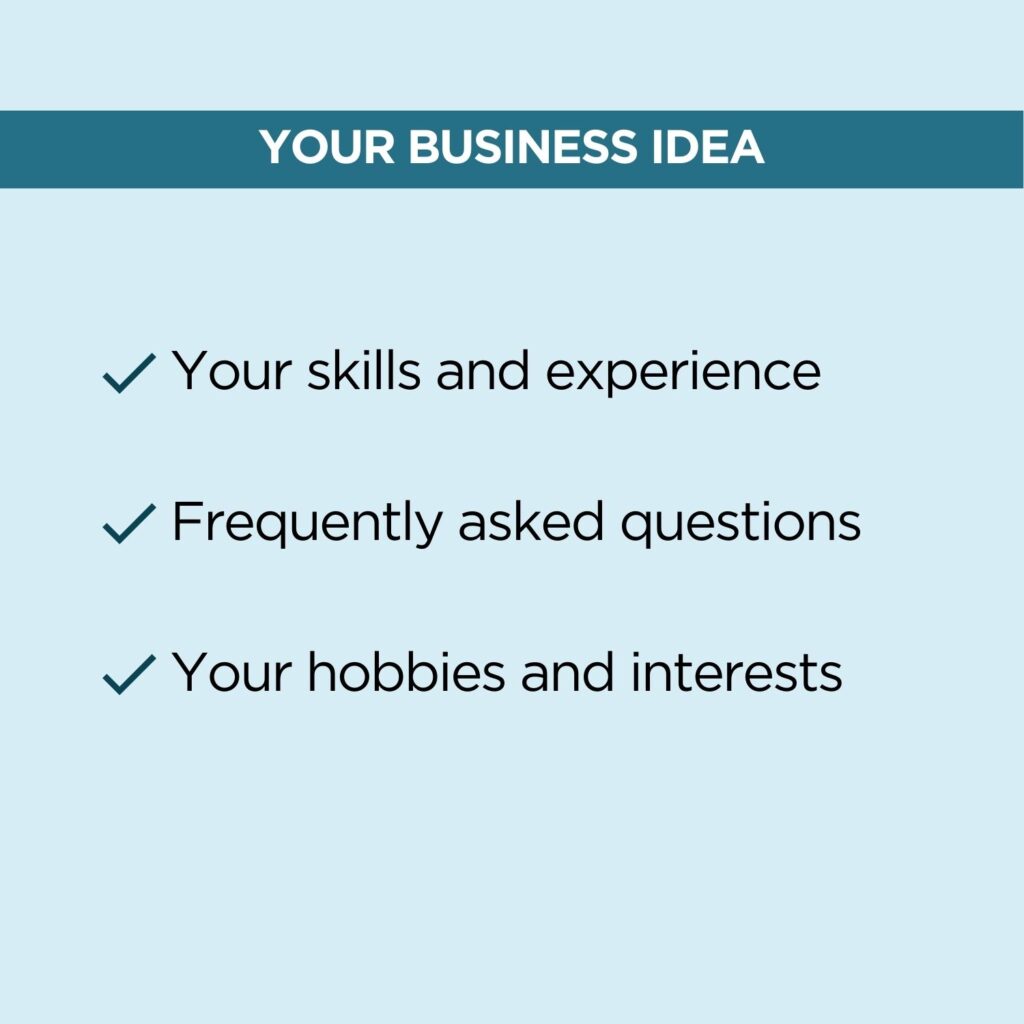
To recap:
- Use a skill you already have.
- See if it’s something people want to and can pay for.
If you want to learn more about finding a profitable business idea, check out this video:
Next:
Let’s use market research to drill down your business ideas into one, profitable offer.
Validate your business idea
One of the biggest mistakes new online business owners make is they jump straight into creation mode. And then they pour time and energy into a product – instead of first figuring out if their product is something people want.
How do you do that, though?
Get the Ultimate Guide
for building a
6-Figure Coaching Business so you can achieve more freedom!
By validating your online business idea before you start working on it.
And the first step to validating your business idea is by researching your market.
Market research essentially means that you research your target market to understand what they want.
People have to be WILLING to pay for what you’re selling.
Not only that, but your client’s ability to pay is equally important.
If your potential customers don’t have the money to pay for your services, you won’t get far.
And to figure it out, get your ideal clients on the phone and ask them.
Hold short “interviews” where you chat about why they want your services. Don’t just look for answers like “I want to be healthy.”
But look for those underlying, deep desires – “I want to look good in my swimsuit” or “My diabetes is back. I want to be around for my kids.”
To find people to interview, you can connect with them on online forums and different social media platforms. For example, my students use platforms like Facebook groups and Reddit to find people who are interested in their services.
After you’ve had a few of these calls, you’ll have a much better understanding of who your target audience is and how you can help them. Not only will you feel more confident about your business idea, but you’ll also be able to create a business that truly helps people.
Then, you can build a “minimum viable product” or MVP.
Essentially, this is a first version of your product or service. For example, a software MVP is just the bare-bones of that SaaS tool. Similarly, you’d create the first online course module and then develop the rest of your course as you work with your first few clients.
Now, it’s time to create your product or service.
Develop your product or service
Once you’ve validated your business idea, it’s time to create your product or services.
How?
Here’s how to create physical products, services, and digital products.
Physical products
How do you create a physical product?
Take these steps:
- Design/develop your product: Create a plan or prototype of what you want your product to look like.
- Source your products/materials: Find reputable manufacturers to work with to create your final product.
- Set a price for your product: Figure out how to price your product by looking at competitors, your market, and your unique selling proposition.
- List your product for sale: List your products on Amazon, Etsy, or other online marketplaces. You can also sell products on social media and your own website (for example, by building a website on Shopify).
The exact process will depend on the type of product you’re selling.
So do your research on any design, manufacturing, or licensing elements you need to know about for your specific product before you start.
Services
The best part about starting a service business is that you don’t need much else than your skills.
Instead, you can start selling and delivering your service to the people who need it.
But you still need to have a package option.
For example, as a coach or consultant, you might offer an initial three-month coaching package and price it at $1,500.
Most importantly, your package needs to offer clear results – that’s why people buy from you. You can then fully map out your methodology as you work with your first few clients.
Digital products
Here’s the process of creating your first online course:
- Outline: Create an outline of the modules and lessons of your course. As a rough guide, a well-designed course has 4-8 modules and 3-5 lessons within each module.
- Create the first module: You don’t need to create the full course to start selling. In fact, I recommend you create the first module, sell your course, and then create it based on student feedback.
- Launch your course: Live webinars and/or challenges are proven strategies for launching your course.
- Tweak your course based on feedback: After you’ve sold your course, engage with your new students to learn what’s working and what’s not. Use that feedback to tweak your course so it’s even better for the next cohort.
Figure out your finances
How are you financing your business?
Do you need external funding?
If you’re starting a service business like coaching, you don’t need extra investment.
But a software business might.
Another aspect of this is your pricing structure.
Examples include:
- One-off payments
- Subscriptions
- Free/premium models
Choose a payment method for your business like Stripe or PayPal that will allow your pricing structure. Then, figure out how much you’re going to charge for your products and services, as well as your profit margins, costs, and more.
Your financial modeling should include:
- The prices of your services or products
- Start-up costs
- Marketing costs
- Outsourcing/hiring
- Admin/bureaucracy costs (registering your business, licenses…)
- Inventory costs
Speaking of inventory, let’s look at how you can source your products.
Source your products
Service businesses can skip this step because you are the product.
But e-commerce business owners need to source materials and/or products.
If you’re starting an e-commerce business, you need reliable sources of inventory by finding manufacturers and suppliers.
This guide shows you how to find the right manufacturing partners.
Choose a business name
How do you choose a business name?
The thing is, you shouldn’t spend too much time searching for the “perfect” business name.
For example, if you’re starting a coaching business, you don’t need a creative name. Instead, you can just use your own name and move on.
If you need help with finding a name, use the Shopify Business Name Generator to find ideas.
Once you have a name, get a domain for your website from a domain name broker like Hover.
Build your website or platform
You don’t need an expensive website right away.
Instead, start lean and focus on what will bring in most customers right now.
Once you have your first customers you can start thinking more about your website, web design, and all that goes with it.
I made my first $5K after launching my coaching business without a website or even a sales page. And even up until I had made $20K in my business, I used a standard WordPress theme that cost me $150.
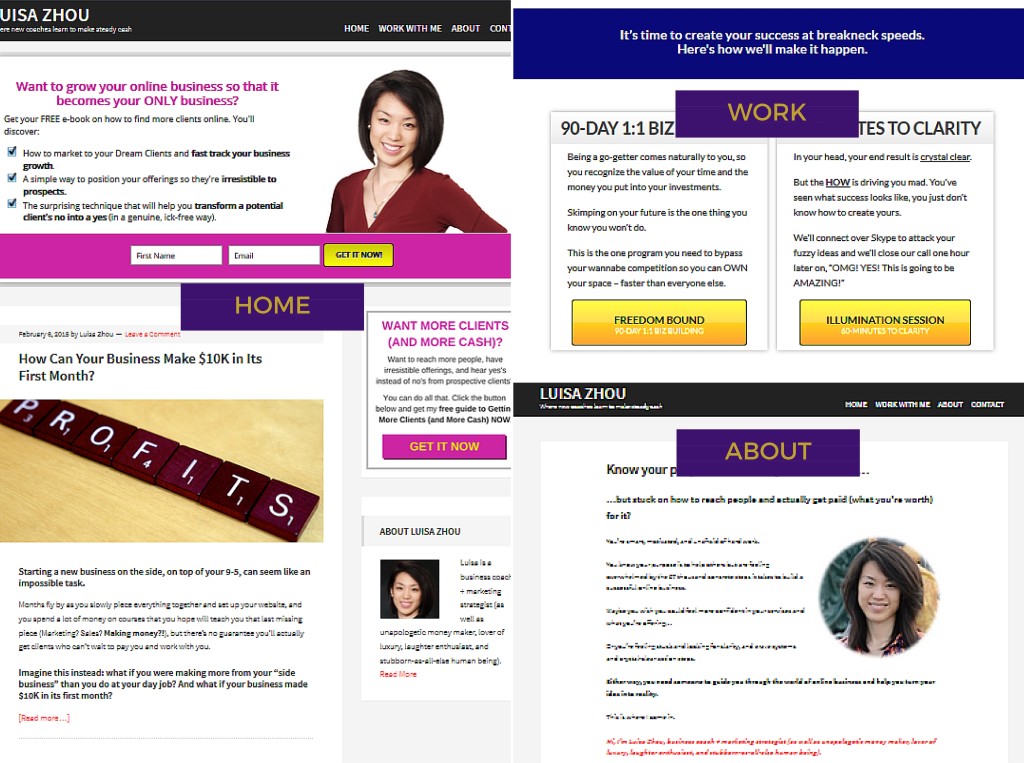
You can build a website from scratch yourself, hire a pro, or use a platform.
For your first website, look into options like these:
- For e-commerce businesses – Shopify
- For online marketplaces – Sharetribe
- For service businesses (freelancers, coaches, and consultants) – WordPress
- For online courses and memberships – Teachable
Adhere to applicable laws and regulations
Quick disclaimer:
This advice is not meant as legal advice. I recommend that you consult a legal expert for tailored legal information that applies to your specific situation. This is just a general overview and doesn’t necessarily apply to your situation.
Now that we have that out of the way, what should your legal business structure look like?
This depends on the business you’re building. I recommend that you go with the easiest option because you can change your legal structure later on.
If you’re starting a business by yourself, a sole proprietorship or a limited liability company or an LLC can be good options. (The main difference is how much liability you take on as a small business owner). You can read more about the different business structures here.
To register your business, take a look at this SBA guide.
Be clear on the permits you need, too. A few questions to ask yourself are:
- Do you need a business license?
- Do you need permits?
- Are there inspections you need to go through?
- Do you need a sales tax license?
- Are there local or other specific regulations that apply?
Build your brand
How do you create a stand-out brand?
Answer these questions:
- How are YOU different? How are you/your business different from your competitors? Think: Personality, voice, all those things that make you unique.
- How is your “secret sauce” different? How do you help your customers get results and how does that differ from your competitors? Alternatively, if you sell products, think about what makes your products special.
- How are your values and beliefs different? Does your business stand for something? Make it clear.
- How is your audience different? Do you serve a specific target market? That’s what you’ll want to highlight.
- How is your product different? Do you offer a better service than others? Do you make things easier for clients? Think about how your product features are different.
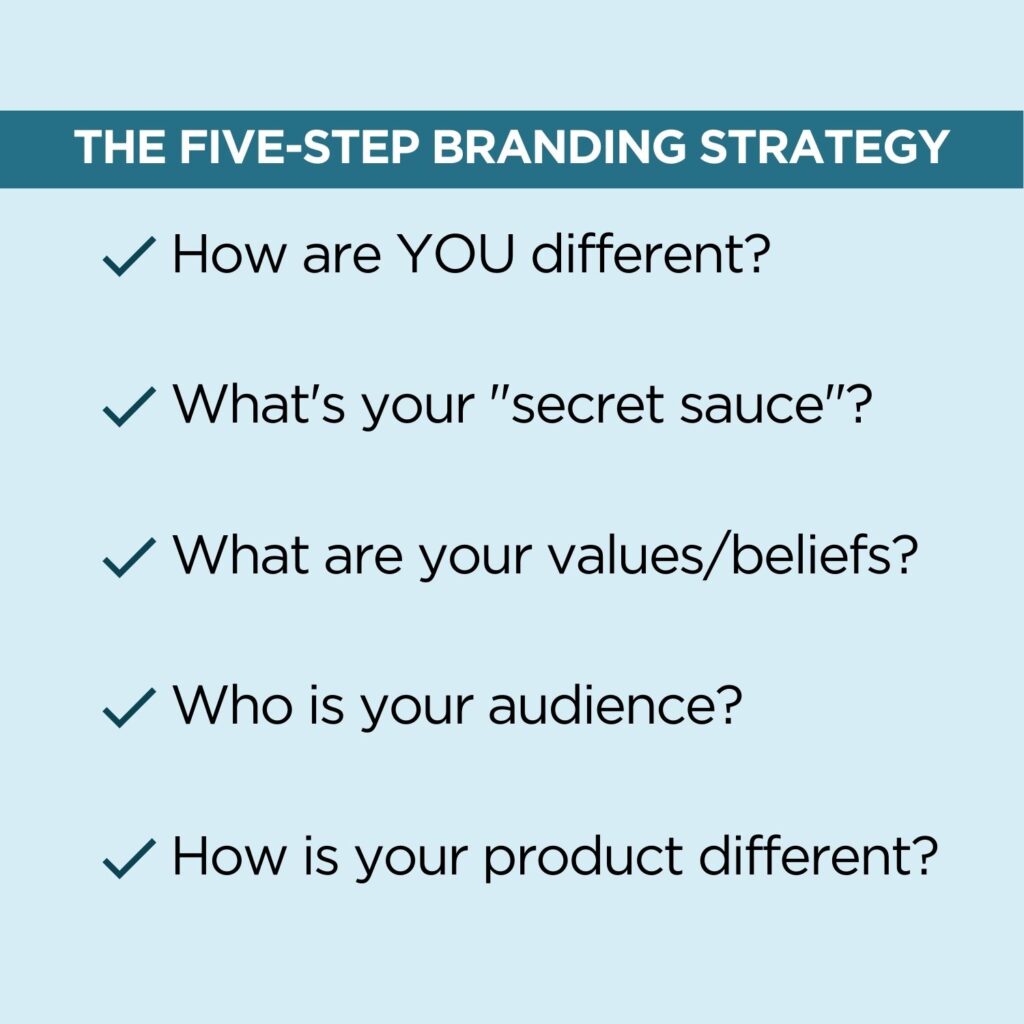
Once you’re clear on your brand identity, it’s time to market your business.
And here’s how.
Market your business
There are many marketing strategies, but these are the ones I find most effective as a business owner:
- Organic social media marketing: Choose a platform where your audience hangs out and go in with the intention to offer value. Entertain people by telling them stories and share fun content because that’s what people are looking for on social media.
- Search engine optimization (SEO): SEO is a long-term business strategy because it takes time to build organic traffic from search engines. Once your business is making money, consider investing in SEO because it’s a highly profitable marketing channel.
- Paid ads: Paid ads (Facebook or Google) can be a fast and effective way for marketing your business.
- Affiliate marketing: Partner with influencers in your niche who promote your product and get a cut of your profits.
- Guest blogging/podcasting: Promote yourself as a guest host or blogger on popular websites within your niche.
Want a quick marketing plan? Here’s what I suggest:
Start with 1-2 strategies at first. These strategies should be the ones that will give your business the fastest results for your specific product.
For example, consistently share value and build relationships on a social media platform. Then, scale with SEO and/or ads when you’re starting to bring in income that you can reinvest into the business.
And if you want more on how to start your business, take a look at this quick video:
Frequently asked questions about starting an online business
What is the easiest online business to start?
The easiest online business to start is a service business like coaching, consulting, or freelancing. These businesses require very low investment upfront. You can get started with the skills you already have. They are profitable because the running costs for service businesses are low. You can also scale these businesses easily with group programs and online courses when you’re ready.
How do you start an online business for beginners?
The best way to start an online business as a beginner is to monetize the skills you already have. When you start a business, you’ll need to learn the basics of business, such as marketing, selling, operations, and so on. That’s already a learning curve. So if you want to build a profitable business fast and leave your 9-5, you don’t want to slow yourself down by also having to learn how to create a product or develop a disruptive business idea. Instead, go for low-hanging fruit and sell the skills you already have with a service business like freelancing or coaching.
How can you start an online business with no money?
If you have no money to start a business, use your existing skills to create a service business. With a service business like freelancing or coaching, you don’t need an inventory or even a website. You can market your services for free on social media and use email marketing by building an email list using free tools like Mailchimp. Once you get your first paying clients, you can invest in more professional branding and marketing strategies.
Get the Ultimate Guide
for building a
6-Figure Coaching Business so you can achieve more freedom!
How do you start a successful online business from home?
To start a successful online business from home, focus on providing a service like freelancing, coaching, or consulting. These are the most profitable and easiest types of businesses to start from home. E-commerce businesses can be highly profitable but you need inventory and somewhere to store your products. Plus all the costs associated with physical products. By starting a service business, you can start lean.
Next steps
There you have it! How to start an online business from scratch.
If you choose a profitable business idea and follow the path, you could build a business that could free you from your 9 to 5.
If that’s your ultimate goal, I have something for you.
Coaching is one of the most profitable business ideas that we talked about. If you want to get started as a coach and create a more abundant and flexible life, get my FREE blueprint on how to start your own online business (even if you’re in a 9-5).
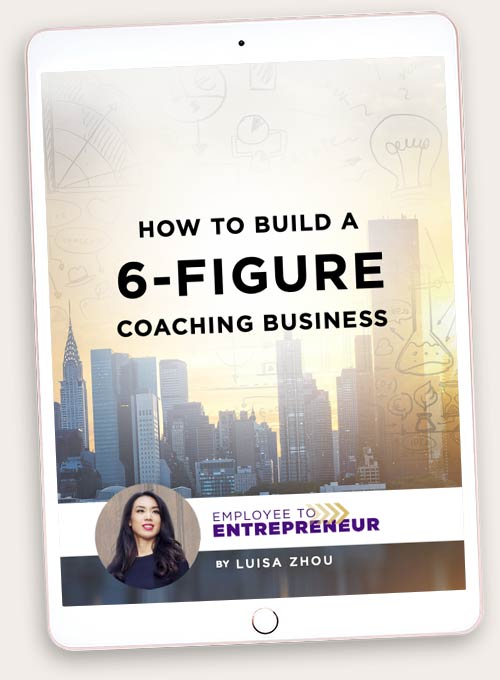
Want to Build a 6-Figure Coaching Business So You Can Achieve More Freedom?
Get Instant Access To My FREE Ultimate Guide Below!
When you sign up, you’ll also receive regular updates on building a successful online business.
Read more:
The Best Online Business Ideas
Online Business Checklist & Toolkit
How to Build a Six-Figure Business
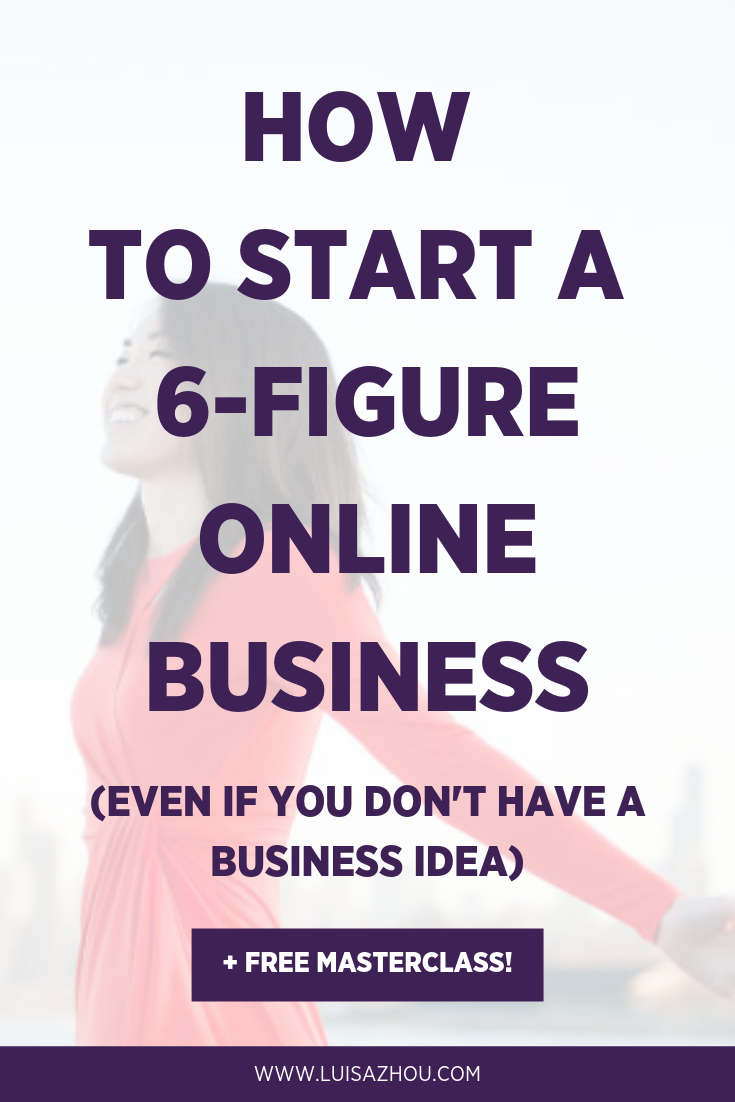




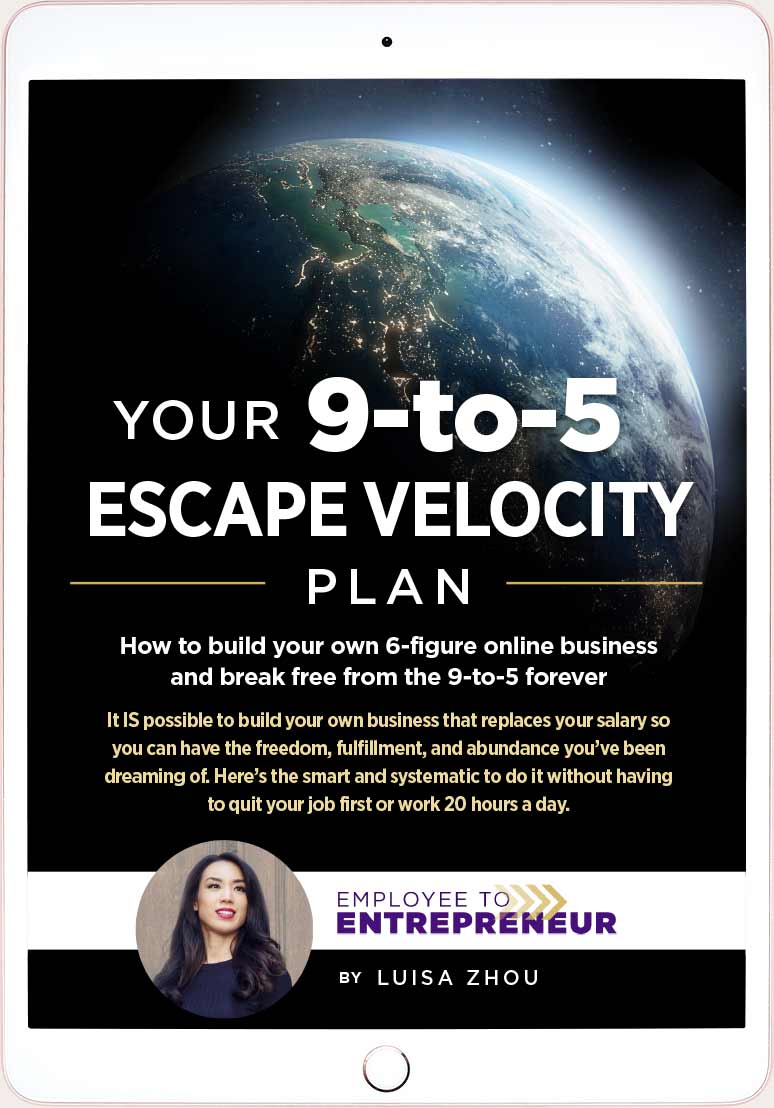



3 Responses
Hi Luisa, This was wonderful and detailed information on something about which I have been thinking for a long time now. Thank you for motivating me to start on my own. I would like to have more and specific information on how I can start my own business, especially related to network marketing.
Looking forward to more valuable posts from you.
So happy to hear this helped motivate you! 🙂
As times goes by, more and more tools are produced so that you can do anything without the skills. You hire less and achieve more. This is a great opportunity for creating an online business.